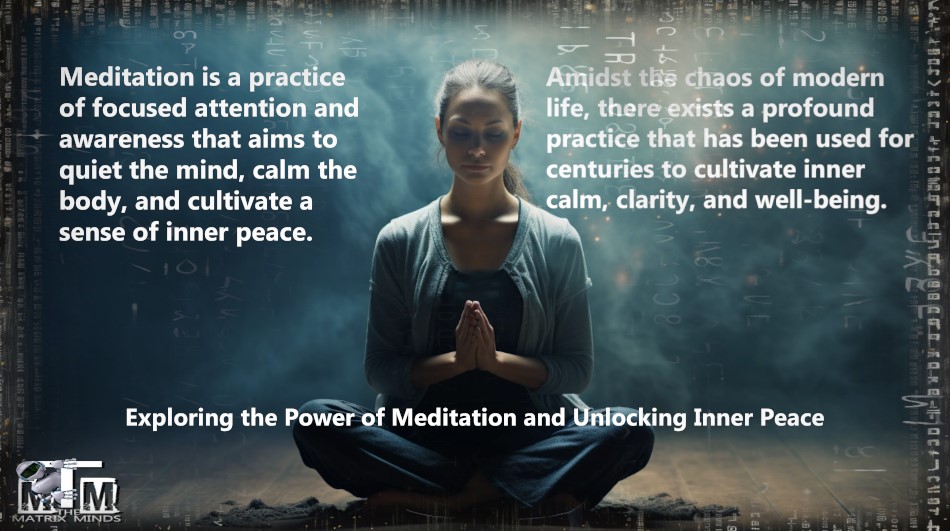In today’s fast-paced world, filled with constant distractions and demands, finding moments of peace and tranquility can feel like a rare luxury.

Yet, amidst the chaos of modern life, there exists a profound practice that has been used for centuries to cultivate inner calm, clarity, and well-being: meditation. More than just a trendy wellness buzzword, meditation is a powerful tool that offers a myriad of physical, mental, and emotional benefits. Let’s delve into the transformative power of meditation and how it can positively impact every aspect of our lives.
What is Meditation?
At its core, meditation is a practice of focused attention and awareness that aims to quiet the mind, calm the body, and cultivate a sense of inner peace. While meditation has roots in ancient spiritual traditions such as Buddhism and Hinduism, it is not inherently religious and can be practiced by people of all backgrounds and beliefs.
There are many different forms of meditation, ranging from mindfulness meditation, where one observes and accepts present moment experiences without judgment, to loving-kindness meditation, where one cultivates feelings of compassion and goodwill towards oneself and others. Regardless of the specific technique, the essence of meditation lies in the cultivation of presence, mindfulness, and self-awareness.
THE IMPACT OF MEDITATION ON THE BRAIN
The Benefits of Meditation
The benefits of meditation extend far beyond the meditation cushion and into every aspect of our lives. Scientific research has revealed a wealth of evidence supporting the positive effects of meditation on physical health, mental well-being, and emotional resilience. Some of the key benefits include:
- Stress Reduction: Meditation has been shown to lower levels of stress hormones such as cortisol, reduce perceived stress, and increase resilience to stressors in daily life.
- Improved Mental Health: Regular meditation practice has been linked to reduced symptoms of anxiety, depression, and other mood disorders. It can also enhance emotional regulation and increase feelings of happiness and well-being.
- Enhanced Focus and Concentration: Meditation strengthens the brain’s ability to sustain attention and resist distractions, leading to improved concentration, productivity, and cognitive performance.
- Better Sleep: Meditation can promote relaxation, reduce insomnia, and improve sleep quality by calming the mind and body before bedtime.
- Increased Self-Awareness: Through introspection and observation of one’s thoughts, emotions, and sensations, meditation fosters greater self-awareness, insight, and understanding of oneself.
- Greater Compassion and Empathy: Loving-kindness meditation cultivates feelings of compassion, kindness, and empathy towards oneself and others, leading to improved relationships and social connections.

Incorporating Meditation into Daily Life
Incorporating meditation into your daily routine doesn’t have to be complicated or time-consuming. Even just a few minutes of meditation each day can yield significant benefits over time. Here are some tips for getting started:
- Start Small: Begin with short meditation sessions, such as 5-10 minutes, and gradually increase the duration as you become more comfortable with the practice.
- Find a Quiet Space: Choose a quiet and comfortable space where you can sit or lie down without distractions. It could be a corner of your home, a park, or even your office.
- Focus on the Breath: Use your breath as an anchor for your attention. Notice the sensations of the breath as it enters and leaves your body, and gently bring your attention back to the breath whenever your mind wanders.
- Be Kind to Yourself: Remember that meditation is a practice, and it’s natural for the mind to wander. Instead of judging yourself, simply observe your thoughts with curiosity and compassion.
- Experiment with Different Techniques: Explore different types of meditation to find what resonates with you. Whether it’s mindfulness, loving-kindness, or guided imagery, there’s a meditation practice for everyone.
- Make it a Habit: Consistency is key when it comes to meditation. Try to carve out a specific time each day for your meditation practice, whether it’s first thing in the morning, during your lunch break, or before bed.
Meditation is a powerful tool for cultivating inner peace, reducing stress, and enhancing overall well-being. By incorporating meditation into your daily life, you can tap into a deep reservoir of calm, clarity, and resilience that will positively impact every aspect of your life. So why not take a few moments each day to sit, breathe, and connect with the present moment? Your mind, body, and spirit will thank you for it.



Leave a Reply
Want to join the discussion?Feel free to contribute!